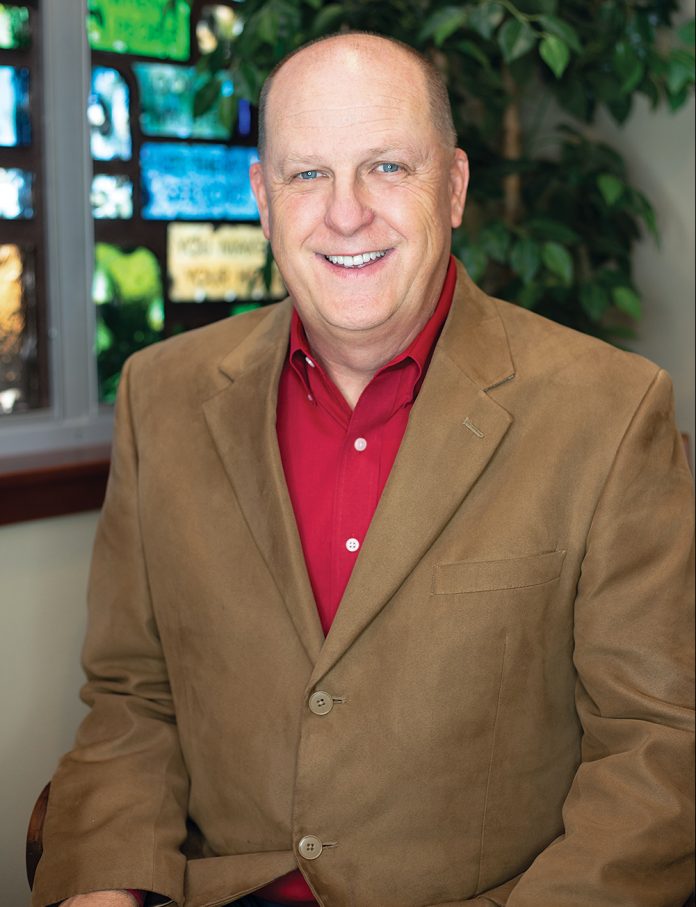Recently, I had the opportunity to hold my newborn granddaughter. As I looked upon her with overwhelming joy, I was amazed at how tiny she was. At birth, she was more than seven pounds, but as she rested in the palm of my hand, I was overwhelmed by the thought that something so small could be so precious. It occurred to me that this is the essence of Christmas.
I wonder what future archeologists will discover about us when they dig up the relics of our society. Regarding Christmas, they may conclude it was a giant festival characterized by things that were big, bright, loud and self-indulgent, or even extravagant, expensive, exorbitant and excessive.
We all know Christmas has become big business and retailers depend on huge sales at this time. We oblige by consuming more than during any other season of the year. In 2015, Texas Monthly Magazine reported the average Christmas spending in Frisco is $2,444 per person. It seems we think “more” is the best way to celebrate; more gifts, more food, more parties, more activities … only to discover that we end up, not with more joy, but more stress.
In their book, “Unplug the Christmas Machine,” Jo Robinson and Jean Coppick Staeheli write: “Within the last century, Christmas has changed from a delightful folk festival and an important religious celebration to a twenty-billion-dollar-a-year (+) commercial venture. Each December, millions of Americans find themselves spending more money than they can really afford, taking on more responsibilities than they can comfortably handle and spending less relaxed time with their families than at any other time of the year. Some people have more problems with Christmas than just a mild feeling of tiredness and a thick stack of bills. Every holiday season, there is a 15 percent increase in the number of people seeking professional help for depression. And debt counselors report that the bulk of their clients come to them in February, when the holiday bills arrive.”
The essence of Christmas is not how big we make it, but how beautifully small it is. The Biblical story of Jesus’ birth is about how God entered the world, not as a grand monarch, but as a baby. God chose a stable instead of a palace. In Luke’s Gospel, Jesus’ earthly parents were unwed peasants traveling for taxation purposes. In Matthew’s Gospel, Jesus and his parents were forced to flee the terror of their homeland, becoming refuges in Egypt. I can imagine how people who saw Jesus observed how tiny he was.
I wonder if God came to us in the form of a baby to remind us that the greatest joys come in the little things; a smile or embrace, a kind word or deed, a shared dream or remembrance? Like a healthy weight-loss program, we will not lose all the excess and commercialism at once, but wouldn’t it be nice to shed the extra weight this season carries with it? Here are a few ideas:
Observe Advent. Advent is a season of preparation and expectant waiting for the birth of the Christ child. In many Christian traditions, Advent occurs four to seven weeks before Christmas. Candles, calendars and simple rituals mark the days leading up to the celebration of Christmas. In Advent, we are compelled by prophets like Isaiah who instruct us to “prepare the way for the Lord; make straight in the desert a highway for our God.”
By slowing down the race to Christmas, we have more time to observe and cherish the little things. We forget that our ancestors did not put up Christmas trees until Christmas Eve. Today, many of us remove the decorations as soon as Christmas Day is over because we started too early. Observing Advent restores a meaningful rhythm that prepares us for Christmas.
Be creative. We say it is the thought that counts, but I am not sure we really mean it. We have turned gift-giving into gift exchanging, with some kind of quid pro quo involved. We lose all sense of creativity. A gift is intended to be a form of self-expression honoring the relationship between the giver and recipient. In that spirit, do what comes naturally and brings joy. If you love to bake, then bake. If you love to compose short-stories, poetry or music, then compose. I love photography, so many gifts I give are pictures I have taken during the year. Give something that gives you life and does not drain your time, energy or bank account.
 Remember that, often, simple gifts have the longest lasting effect. In 1818, a parish priest in Austria named Franz Gruber penned a poem for a friend named Joseph Mohr who was the choir director at that church. Since the organ was broken, Mr. Mohr wrote accompaniment to the poem for a guitar and two solo voices, resulting in the most beloved Christmas carol of all, “Stille Nacht,” or, “Silent Night.”
Remember that, often, simple gifts have the longest lasting effect. In 1818, a parish priest in Austria named Franz Gruber penned a poem for a friend named Joseph Mohr who was the choir director at that church. Since the organ was broken, Mr. Mohr wrote accompaniment to the poem for a guitar and two solo voices, resulting in the most beloved Christmas carol of all, “Stille Nacht,” or, “Silent Night.”
Be compassionate. The spirit of Christmas really begins when we extend our gift-giving beyond family and friends. Instead of purchasing something that will be discarded or put in a drawer, why not give a gift to a ministry or charity in honor of your friend or family? I have a colleague whose church was digging fresh water wells in Africa. He challenged his congregation to give the same amount they would spend on their family at Christmas to this initiative. He called the campaign “Christmas is Not Your Birthday.” Many churches, like ours, run a program in December called “Christmas Gifts that Make a Difference,” which allows people to make contributions to missions in the name of loved ones.
One of my favorite Christmas carols is “Good King Wenceslas.” It tells the story of a Bohemian king who looked out the window of his palace on St. Stephen’s Day, which is December 26. He observed a poor homeless man attempting to gather firewood. Moved by compassion, the king gathered food and drink and rushed out to help. Even as the night grew bitterly cold, Good King Wenceslas was not deterred. The song ends with the words “therefore, Christian men, be sure, wealth or rank possessing, ye who now will bless the poor shall yourselves find blessing.”
Be “with” others. We forget the most important gift is the gift of our presence. Spending time with loved ones is so important, especially in a world that is moving faster and demands more of our time. Think how grateful someone would be if they could simply get a couple hours of uninterrupted time with us.
A moniker assigned to Jesus is “Emmanuel,” which means “God with us.” This is God’s design for our relationship. God does not want to be distant and aloof. God desires to be with us in all things. I have often wondered if the carol “Joy to the World” is misnamed. Maybe it would be better named “Joy With the World.”
May we find the joy in celebrating God’s presence this Christmas … especially in the little things.
Billy Echols-Richter is the pastor of Grace Avenue United Methodist Church.


